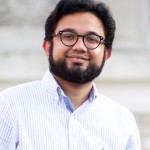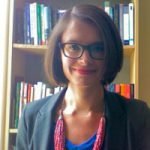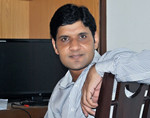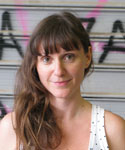Previous IRCPL Fellows
2015-16 IRCPL Graduate Fellows
 Hannah Elmer is a PhD Candidate in the Department of History at Columbia University, where she specializes in the cultural, religious and intellectual history of later medieval and early modern Central Europe. She is currently conducting research for her dissertation, which examines the practice of emergency resuscitation and baptism of dead infants in Polish- and German-speaking regions. She is seeking to explain why, suddenly in the fifteenth century, thousands of people sought the miraculous reanimation of dead, unbaptized children at particular holy sites across Europe. In addition to changes in theology, liturgy and popular piety, she is examining changes in conceptions of nature and knowledge-production to understand the emergence and development of this phenomenon. Before beginning her PhD in 2011, Hannah lived, studied and worked in Vienna, Austria and Berlin, Germany. She received an MA in Early Modern History from the Free University of Berlin in 2011, and she graduated summa cum laude from Barnard College in 2006 with a BA in Medieval and Renaissance Studies.
Hannah Elmer is a PhD Candidate in the Department of History at Columbia University, where she specializes in the cultural, religious and intellectual history of later medieval and early modern Central Europe. She is currently conducting research for her dissertation, which examines the practice of emergency resuscitation and baptism of dead infants in Polish- and German-speaking regions. She is seeking to explain why, suddenly in the fifteenth century, thousands of people sought the miraculous reanimation of dead, unbaptized children at particular holy sites across Europe. In addition to changes in theology, liturgy and popular piety, she is examining changes in conceptions of nature and knowledge-production to understand the emergence and development of this phenomenon. Before beginning her PhD in 2011, Hannah lived, studied and worked in Vienna, Austria and Berlin, Germany. She received an MA in Early Modern History from the Free University of Berlin in 2011, and she graduated summa cum laude from Barnard College in 2006 with a BA in Medieval and Renaissance Studies.
 Roni Henig is a PhD Candidate in the department of Middle Eastern, South Asian and African Studies and the Institute for Comparative Literature and Society at Columbia University. Her dissertation, tentatively titled “Life of the Non-Living: Nationalization, Language and the Narrative of ‘Revival’ in Modern Hebrew Literary Discourse,” focuses on the intellectual history of Jewish modernity and offers a critical analysis of the narrative of Hebrew’s revival in late 19th and early 20th century Hebrew literature. Her interests include modern Jewish literatures, the critique of nationalism, subjectivity and subjectivation, philosophy of language and translation theory. Roni completed her MA at Columbia University and earned her BA in Comparative Literature from Tel Aviv University Summa Cum Laude.
Roni Henig is a PhD Candidate in the department of Middle Eastern, South Asian and African Studies and the Institute for Comparative Literature and Society at Columbia University. Her dissertation, tentatively titled “Life of the Non-Living: Nationalization, Language and the Narrative of ‘Revival’ in Modern Hebrew Literary Discourse,” focuses on the intellectual history of Jewish modernity and offers a critical analysis of the narrative of Hebrew’s revival in late 19th and early 20th century Hebrew literature. Her interests include modern Jewish literatures, the critique of nationalism, subjectivity and subjectivation, philosophy of language and translation theory. Roni completed her MA at Columbia University and earned her BA in Comparative Literature from Tel Aviv University Summa Cum Laude.
 Nicole T. Hughes is a Ph.D. candidate in the Department of Latin American and Iberian Cultures and the Institute for Comparative Literature and Society at Columbia University. Her research focuses on late medieval Iberia and the early modern Iberian worlds, especially New Spain and Brazil. Before joining Columbia, she received an MA in Comparative Literature from NYU and edited works of non-fiction as assistant editor to Penguin Press. In 2012 and 2014, she studied Nahuatl in its modern and classical variants at the IDIEZ Institute (Instituto de Docencia e Investigación Etnológica de Zacatecas). She has received grants from the Ibero-Amerikanisches Institut in Berlin and the John Carter Brown Library as well as a Mellon Humanities International Travel Fellowship. Nicole is currently writing a dissertation entitled A Theater of the Americas: Dramatic Creation and Historical Imagination, 1500-1640 . The dissertation argues that theater was invented in the Americas in a crucial tension between the re-imagination and staging of history on the one hand and the creation of new dramatic forms and languages on the other.
Nicole T. Hughes is a Ph.D. candidate in the Department of Latin American and Iberian Cultures and the Institute for Comparative Literature and Society at Columbia University. Her research focuses on late medieval Iberia and the early modern Iberian worlds, especially New Spain and Brazil. Before joining Columbia, she received an MA in Comparative Literature from NYU and edited works of non-fiction as assistant editor to Penguin Press. In 2012 and 2014, she studied Nahuatl in its modern and classical variants at the IDIEZ Institute (Instituto de Docencia e Investigación Etnológica de Zacatecas). She has received grants from the Ibero-Amerikanisches Institut in Berlin and the John Carter Brown Library as well as a Mellon Humanities International Travel Fellowship. Nicole is currently writing a dissertation entitled A Theater of the Americas: Dramatic Creation and Historical Imagination, 1500-1640 . The dissertation argues that theater was invented in the Americas in a crucial tension between the re-imagination and staging of history on the one hand and the creation of new dramatic forms and languages on the other.
 Sohaib Khan a doctoral student in the Department of Middle Eastern, South Asian, and African Studies (MESAAS) and the Institute of Comparative Literature and Society (ICLS). He specializes in the study of Islamic commercial law, postcolonial theory and the anthropology of religion. His research project broadly concerns the shaping of religion and ethics in the cultural and virtual spaces of financial markets. More specifically, he is interested in the translation practices of Muslim jurists and financial engineers that authorize Shari‘a replicas of debt-based financial instruments in the institutional context of modern Islamic banking. To this end, he plans to conduct ethnographic fieldwork in the madrasahs and Islamic banks of Pakistan. He has also made ethnographic forays into Islamic financial institutions established in the Arab world, namely in Amman, Jordan, and Muscat, Oman. Sohaib holds an MA in Religion from Duke University and a BSc. (Hons) in Economics from the Lahore University of Management Sciences (LUMS), where he later taught as a Teaching Fellow in the Department of Humanities and Social Sciences. He has also studied classical Islamic law and Arabic literature under scholars of the Hanafite legal tradition in Lahore and Karachi, Pakistan, and in Amman, Jordan.
Sohaib Khan a doctoral student in the Department of Middle Eastern, South Asian, and African Studies (MESAAS) and the Institute of Comparative Literature and Society (ICLS). He specializes in the study of Islamic commercial law, postcolonial theory and the anthropology of religion. His research project broadly concerns the shaping of religion and ethics in the cultural and virtual spaces of financial markets. More specifically, he is interested in the translation practices of Muslim jurists and financial engineers that authorize Shari‘a replicas of debt-based financial instruments in the institutional context of modern Islamic banking. To this end, he plans to conduct ethnographic fieldwork in the madrasahs and Islamic banks of Pakistan. He has also made ethnographic forays into Islamic financial institutions established in the Arab world, namely in Amman, Jordan, and Muscat, Oman. Sohaib holds an MA in Religion from Duke University and a BSc. (Hons) in Economics from the Lahore University of Management Sciences (LUMS), where he later taught as a Teaching Fellow in the Department of Humanities and Social Sciences. He has also studied classical Islamic law and Arabic literature under scholars of the Hanafite legal tradition in Lahore and Karachi, Pakistan, and in Amman, Jordan.
 Andrew Lebovich is a PhD student in the Department of History at Columbia University. He holds a BA in History from Dartmouth College, and an MA in History from Columbia University. His research focuses on the historical and contemporary connections between North and West Africa, with a particular emphasis on issues of religious reform, Islamic organizations, and the interaction between religion and politics in Algeria, Morocco, Mali, and Senegal. He has also researched and presented on nationalism and opposition movements in the contemporary Sahara and Sahel.
Andrew Lebovich is a PhD student in the Department of History at Columbia University. He holds a BA in History from Dartmouth College, and an MA in History from Columbia University. His research focuses on the historical and contemporary connections between North and West Africa, with a particular emphasis on issues of religious reform, Islamic organizations, and the interaction between religion and politics in Algeria, Morocco, Mali, and Senegal. He has also researched and presented on nationalism and opposition movements in the contemporary Sahara and Sahel.
2014-15 IRCPL Graduate Fellows
 John Chen is a PhD candidate in the Department of History at Columbia University. His dissertation, tentatively titled Re-Orientation: The Chinese Azharites between Islamic World and Third World, 1931-55, is an intellectual, political, and social history of a group of Chinese Muslim scholars who studied at Cairo’s Azhar University in the 1930s and 1940s. More broadly, John’s interests include modern China; the modern Middle East; Chinese Islam; Islamic movements and networks; revolutionary ideologies; the origins, rhetoric, and impact of decolonization; and the global Cold War. An article introducing some of his dissertation material appears in a 2014 issue of Comparative Studies of South Asia, Africa, and the Middle East (cssaame). Prior to entering Columbia, he studied at the American University in Cairo’s Center for Arabic Study Abroad (CASA) with the support of a Fulbright fellowship, received further translation training with the support of a Critical Language Enhancement Award, and worked for two years at the Council on Foreign Relations in New York. A native of Needham, Massachusetts, he earned his BA from Harvard University in 2008. He speaks Chinese in addition to Arabic and has traveled extensively throughout Asia, Europe, and the Middle East.
John Chen is a PhD candidate in the Department of History at Columbia University. His dissertation, tentatively titled Re-Orientation: The Chinese Azharites between Islamic World and Third World, 1931-55, is an intellectual, political, and social history of a group of Chinese Muslim scholars who studied at Cairo’s Azhar University in the 1930s and 1940s. More broadly, John’s interests include modern China; the modern Middle East; Chinese Islam; Islamic movements and networks; revolutionary ideologies; the origins, rhetoric, and impact of decolonization; and the global Cold War. An article introducing some of his dissertation material appears in a 2014 issue of Comparative Studies of South Asia, Africa, and the Middle East (cssaame). Prior to entering Columbia, he studied at the American University in Cairo’s Center for Arabic Study Abroad (CASA) with the support of a Fulbright fellowship, received further translation training with the support of a Critical Language Enhancement Award, and worked for two years at the Council on Foreign Relations in New York. A native of Needham, Massachusetts, he earned his BA from Harvard University in 2008. He speaks Chinese in addition to Arabic and has traveled extensively throughout Asia, Europe, and the Middle East.

Susanna Ferguson is a Ph.D student in the Department of History at Columbia University. She holds a B.A. in History from Yale University and an M.A. in Middle Eastern Studies from NYU. Her research focuses on the social and intellectual history of women and gender in the modern Arab world, Arab feminist thought and practice in the 20th century, and questions about women and gender in modern Islamic movements. She is particularly interested in the concepts and practices which have been mobilized by women in the Arab world to articulate ideas about personhood and visions for the future, and the kinds of subjectivities those concepts and practices have helped to produce.
 Wendell Hassan Marsh is a doctoral student in the Department of Middle Eastern, South Asian, and African Studies and the Institute of Comparative Literature and Society. His work lies at the intersection of the study of Islam in the African World, Arabic written culture, and African Intellectual History, all inflected by a postcolonial sensibility. Specifically, his research interrogates the Islamic library in Africa as a locus of knowledge production and circulation. He is especially interested in milieux associated with the Tijaniyya Sufi brotherhood. His secondary interest involves simultaneously decolonizing the Digital Humanities and leveraging associated methodologies in the study of Africa. A native of Atlanta, Georgia, Wendell has worked as a journalist in Washington, D.C., studied in France and Senegal, and lived in Egypt as a Fulbright Fellow.
Wendell Hassan Marsh is a doctoral student in the Department of Middle Eastern, South Asian, and African Studies and the Institute of Comparative Literature and Society. His work lies at the intersection of the study of Islam in the African World, Arabic written culture, and African Intellectual History, all inflected by a postcolonial sensibility. Specifically, his research interrogates the Islamic library in Africa as a locus of knowledge production and circulation. He is especially interested in milieux associated with the Tijaniyya Sufi brotherhood. His secondary interest involves simultaneously decolonizing the Digital Humanities and leveraging associated methodologies in the study of Africa. A native of Atlanta, Georgia, Wendell has worked as a journalist in Washington, D.C., studied in France and Senegal, and lived in Egypt as a Fulbright Fellow.

Deborah Shulevitz is a PhD. candidate in Medieval European history in the Department of History at Columbia University. Her research centers on the intersection between economic development and religious dissent in thirteenth century France and Italy. Specifically, her dissertation will address the relationship between the sins of heresy (religious activity not conforming to established norms) and usury (economic activity, particularly moneylending, not conforming to religious norms) in that period. Returning to graduate school after a career as a corporate attorney, she earned an M.A. in Medieval Studies from Columbia in 2010. She earned her B.A. from Brown University and her J.D. from Harvard Law School.
2014-15 Human Rights Fellows
IRCPL/AHDA Fellowship
IRCPL is pleased to announce its partnership with Columbia University’s Institute for the Study of Human Rights (ISHR) in funding a Religion Fellowship as part of ISHR’s Fellowship for Historical Dialogue and Accountability (AHDA). This Fellowship program brings to Columbia a skilled human rights practitioner and gives him or her the opportunity to engage in training, networking, project work, and academic study at Columbia University in New York City. During the Fellowship participants will also design a project that addresses a long standing sectarian conflict, history of repression or past gross human rights violations in their society, country or region. affiliates with a forum for constructive interdisciplinary interaction and exposes them to available resources.
2014-15 IRCPL/AHDA Fellow
 Rana Tanveer
Rana Tanveer
Senior Reporter, The Express Tribune Daily
Lahore, Pakistan
Rana Tanveer works as a Senior Reporter with The Express Tribune daily (tribune.com.pk), a publishing partner of International New York Times. As a journalist, Rana is passionate about covering issues relating to religious minorities and human rights. He has become particularly interested in the Ahmadi religious minority and the discrimination this community faces. Writing about the activities of extremist religious organizations; issues related to terrorism among religious extremist organizations; and cases under review within the Pakistani court system are topics he covers as well. As head of a reporting team, Rana’s role at The Express Tribune also includes supervising the reporting team in Lahore to ensure coverage of all important issues of the day.
Ahmadis, who identify themselves as Muslim, but who are considered a heretical sect by the Muslim majority, face a particularly unique set of issues because of their self-identification as Muslims. The Pakistani media, for example, does not give proper coverage of atrocities suffered within their community, and censorship of publications relating to the community is widespread: it is a crime for Ahmadis to call themselves Muslim; the leadership of the Ahmadia community is forbidden from visiting Pakistan, where the largest community (approximately 2 million) of Ahmadis in the world resides; violence against members of the Ahmadiyya community is regularly committed with impunity. As a professional journalist, Rana strives to publicize both the discrimination suffered by the Ahmadi community, but also the lack of redress and tolerance within the community at large. Addressing the historical roots of this violence and the conflicting narratives about the Ahmadi identity are central to reducing discrimination towards the Ahmadiyya community, and allowing members of this community, like those of other religious minorities, to practice their religious beliefs without fear of being attacked. As an AHDA fellow, Rana will develop a project that seeks to address these issues, and that seeks to open up discussion of Ahmadi identity and place in Pakistani society.
2013-14 Graduate Fellows
Tolga Kobas is a Paul F. Lazarsfeld fellow and a PhD candidate at the Columbia University’s Department of Sociology. He has B.A. and M.A. degrees in Political Science from Sabanci University in Turkey. He is currently carrying out archival work in Istanbul for his dissertation. His research investigates how the Ottomans consolidated patrimonial sources and means of power with the needs and requirements of a legal-rational bureaucracy.
Laura McTighe is a Ph.D. student in the Department of Religion at Columbia University. Her research centers on lived religion, migration, and well-being, informed by an anthropology of social suffering and structural injustice. She is particularly interested in how these themes are negotiated and subverted by formerly incarcerated and convicted people’s movements in the United States. Laura’s research has unfolded in consistent conversation with her more than fifteen years of work to support community-led responses to the twin epidemics of mass imprisonment and HIV/AIDS. She earned her M.T.S. in Islamic Studies from Harvard Divinity School in 2008, and her B.A. in Religion and Peace & Conflict Studies from Haverford College in 2000. Her writings have been published in Islam and AIDS: Between Scorn, Pity and Justice (2009), the International Journal for Law and Psychiatry (2011), Beyond Walls and Cages: Bridging Immigrant Justice and Anti-Prison Organizing in the United States (2012) and a variety of community publications.
Ana Méndez-Oliver is currently a Ph.D. candidate at the Department of Latin American and Iberian Cultures at Columbia. She holds a B.A. in Modern Languages and a M.A. in Comparative Literature from University of Puerto Rico and M.A. in Spanish and Portuguese from Columbia University. She has published “Orbecche y los tratados neo-clásicos de Giambattista Giraldi Cinthio” and “El metadiscurso forense en La fuerza de la sangre de Miguel de Cervantes” in Ficciones legales. More recently, she collaborated in Layman Poupard Publishers forthcoming volume,Literary Criticism from 1400 to 1800. Her research interests include French, Italian and Spanish Medieval and Early Modern literature and cultural productions, mysticism and hagiographical literature, Early Modern printing productions, and literary theory.
Rafal Stepien is the inaugural Cihui Foundation Faculty Fellow in Chinese Buddhist Studies in the Department of East Asian Languages and Cultures at Columbia University. Prior to undertaking his doctoral studies at Columbia, Rafal gained degrees from the Universities of Western Australia (B.A., English & Philosophy), Oxford (B.A. & M.A., Chinese), and Cambridge (M.Phil., Persian). He has also spent significant periods studying and researching at Bologna, Esfehan, Damascus, and Peking Universities, as well as at Fo Guang Shan Buddhist Monastery in Taiwan. In addition to these studies, he spent over two years working as a Persian Interpreter with the International Committee of the Red Cross in Afghanistan. Rafal’s research has been funded by numerous awards, including fellowships from the Mellon and Soudavar Memorial Foundations, British Institute of Persian Studies, Weatherhead East Asian Institute, and Chung-Hwa Institute of Buddhist Studies. He has published articles on both Buddhist and Islamic literature in several peer-reviewed journals and edited volumes.
2013-14 ISHR/IRCPL Human Rights Fellow
 Daphne Lappa has studied history at the Universities of Crete and Athens, Greece. She is currently completing her PhD at the European University Institute of Florence, Italy. Her doctoral project addresses the issue of religious conversion and the modes of interaction among Jews, Christians and Muslims in the early modern eastern Mediterranean. Since 2011, she has been working for the multi-communal Association for Historical Dialogue and Research in Nicosia, Cyprus, where she holds the position of Research Officer.
Daphne Lappa has studied history at the Universities of Crete and Athens, Greece. She is currently completing her PhD at the European University Institute of Florence, Italy. Her doctoral project addresses the issue of religious conversion and the modes of interaction among Jews, Christians and Muslims in the early modern eastern Mediterranean. Since 2011, she has been working for the multi-communal Association for Historical Dialogue and Research in Nicosia, Cyprus, where she holds the position of Research Officer.
Daphne’s research interests evolve around the theme of coexistence in diversity, namely how religiously and ethnically diverse communities managed to live alongside in the pre-modern and modern era. She has extensive experience in the fields of social and cultural history and has worked with archival material of diverse periods and nature. She is also especially interested in the use of new technologies in history as a way of minimizing the gap between academic and public history. As an IRCPL Fellow, Daphne will work on the development of a series of graphically powerful and user-friendly on-line interactive maps that will provide a visual, alternative narrative of Nicosia as a shared and contested space in the late 19th and 20th centuries, in an effort to redress the multiple fragmentations that the city’s body and memory have undergone.
2012-13 IRCPL Graduate Fellows
- Talia Andrei, Department of Art History and Archaeology: Mapping Sacred Spaces: Representations of Pleasure and Worship in Shaji sankei mandara.
- Michael Low, Department of History: Colonizing Mecca: The Hajj and Anglo-Ottoman Rivalry in the Hijaz, 1858-1916.
- Elizabeth Marcus, Department of French Romance and Philology: Communities, Continuity and Change: Lebanon and France, 1943-1958.
- Irene Sanpietro, Department of Classics: Fasting, Prayer, Alms: Christian Virtue Theory and the Transition from Apostolic to Institutional Church.
- Drew Thomases, Department of Religion: The King of Pilgrimage Places: Religion, Recreation, and Encounter in Pushkar.
2012-13 IRCPL Undergraduate Fellows
- Jordan Alam, Department of English: Madness and Modernity: The Current Conception of Mental Illness and Mental Healthcare in Bangladesh.
- Nicholas Bloom, Department of History: Taking off the Mask: James Baldwin, Virginia Woolf, and the Consciousness of Revolution.
- Zachary Natan Cohen, Department of Sociology: The Global Hasid: Food Stamps, Remittences, and the Satmar Diaspora.
2011-12 IRCPL Graduate Fellows
- Joseph Blankholm, for field research in Washington DC and in Buffalo on trends and tensions within nonbeliever organizations in the US
- Jared Conrad-Bradshaw, his project on desecularization
- Huma Kidwai, for field research in India on madrassa education reform
- Alex Smolak, for field research in Mali on Islam, female circumcision and HIV risk
2010-11 IRCPL Graduate Fellows
- Jonathan Blake, for field research for your project on the relationship between religion and violence in Israel and Palestine
- Elizabeth Sperber, Deus et Machina? Identity and Institutional Change in Sub-Saharan Africa
- Pavithra Suryanarayan, Political Representation and the Rise of the Neo-Liberal State in India
2009-10 IRCPL Graduate Fellows
- Emily Bech, Withdrawal or Engagement? Immigrant Civic Integration in Denmark and Sweden
- Seth Anziska, Reagan’s Bequest: Cold War Revival and American Misadventures in the Middle East, 1981-1988
2008-09 IRCPL Graduate Fellows
- Susan Andrews, Department of Religion, “Replicating Replicas: The Conjured Temple 化寺 traditions of Mount Wutai 五臺山.”
- Maham Mela, Department of Anthropology, “Education Enrollment Decisions: A Case Study of Pakistan.”
- Charles Lawry, Department of Music, “Rebuilding a Global City / Ghost Town: New Architecture and Denizens of Icelandic Soundspace.”
- Sara L. Snyder, Department of Music, “Poetics, Performance, and Politics: Cherokee Language Revitalization and Expressive Practices on the Qualla Boundary.”
- Elizabeth Sperber, Department of Political Science, “Meltzer and Richard in 3-D: Religion and Redistributive Preference in Rural Uganda.”
